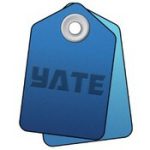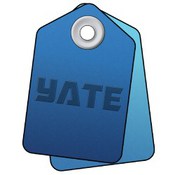Description
Name: Yate for Mac
Version: 3.14.2
Release Date: 25 Oct 2016
Mac Platform: Intel
OS version:OS X 10.6 or later
Processor type(s) & speed: 64-bit
Web Site: https://2manyrobots.com/yate/
Overview:
Yate was developed for people who want complete control over their tagging experience. Supports audio in AIFF, DFF, DSF, FLAC, M4A, M4B, MP3, MP4, STEM.MP4 and WAV files. Supports video in M4V and MP4.
Yate has a long list of features; most importantly, an innovative scripting system called actions. Actions can be used to update all of an album’s tags with a single operation. Yate also supports integration with AcouticBrainz, AcoustID, Beatport, Discogs, iTunes and MusicBrainz. All changes can be easily reverted and individual changes can be undone in any order. Whether you want to automatically or manually tag your files, Yate can do it all!
What’s New in Version 3.14.2:
Tabbed Windows on macOS 10.12 Sierra
・Sierra allows for the automatic tabbing of windows. The default behaviour is set via System Preferences-Dock-Prefer tabs when opening documents
・New Yate Preferences-General settings to control tabbing groups of windows under Sierra. You can override the default system settings and enable the grouping of Action Editor and Database Viewer windows, each in their own group.
・You can also choose to include the Action Manager in the same group as Action Editor windows. This is a great feature for small displays.
・You can optionally choose to merge database viewers into the same tabbed window with actions.
File to Tag
・File to Tag templates can now extract from any number of path components. Previously only the filename and containing folder name were available. You do this by specifying multiple Folder Start tokens, each of which works with a higher up path component.
・There are new qualifier tokens to mark sequences as Required, Optional, Numeric and Not Empty.
・When in the File to Tag template editor you can now preview the template against specified paths as opposed to loaded files. This is useful as at times it may be difficult to find multiple files with the desired paths for testing. To be prompted for test data, hold down the Shift key when starting the preview.
・The File to Tag action statement has been enhanced to support the per file enumeration of a list of templates.
Menus
・If you hold down Alt while clicking on a template in the File to Tag, Rename or Search for Artwork menus, the template is opened in the appropriate editor.
・If you hold down Alt on the Search for Artwork menu’s Default Search item, the associated template will be opened in the appropriate template editor.
Named Variables
・Setting a named variable to the empty string completely removes the all space it previously occupied. The named variable is still accessable as all uninitialized named variables have an empty string as their value. The only difference is that when displaying named variables via the Dump Variables statement, empty named variables will not be displayed.
Actions
・You can now use the Delete key to remove items in an Action Editor window.
・Much better memory management when running an extremely long action through the Batch Processor.
・The Prompt statement allows to you to post the message to the system logging system. On Sierra, in the Console application, it is difficult to find log messages that have been posted before the Console was opened. The online help for the Prompt statement now describes a Terminal command which allows you to reliably see Yate initiated messages passed to the system log on Sierra.
・All query database statements will now initialize the Query Database field if there is a single Open Database for Querying statement, in all open actions, which supplies a prefix. There is also a new Insert Query Database Prefix context menu item in these fields.
Action Statements
・The Delete Non Audio statement was deleting all non audio files when the *:pattern was supplied. *:was intended to delete all empty folders, not files. In order to provide equivalent functionality and to allow you to separate files and folders, the * pattern can be used to delete all non audio files, but not folders. The sequence */*:will delete everything permitted.
・Unless the key passed to any Query Database statement starts with a #, it is trimmed (leading and trailing spaces removed). This was implemented to support symbolic keys which start with a #. You can now simply put a space before the key to avoid the special line number mode.
・The Preferences statement now allows you to reset an Exception or Preference set to its pre-action value. This is done automatically when an action ends but there are cases when you would want to do so while executing.
・The Preferences statement has new override settings for Write ID3v2.3 and Write ID3v2.4. Setting the value to empty resets the value to the setting in the application preferences.
・The List Key statement has a new option which supports per file keys as opposed to a single key for all files.
・The File to Tag action statement has been enhanced to support the per file enumeration of a list of templates.
・The Prompt statment’s Batch Status mode has been renamed to Status. The mode is now available in all contexts to display a message on the main window’s status bar.
・The Date Functions statement now supports the extraction of and offset by Hours, Minutes and Seconds. The resultant date format when offsetting a component is now smart as to what the output format is. There is a new Full options to force a full date/time representation. There is also a new extraction type called Duration. This is a special form used to return a visual representation of a passed number of milliseconds. The returned representation may contain days and hours and will always contain minutes and seconds.
Database Viewer
・The Advanced Filter functionality uses # Column Names to supply integer values for cells. A new heuristic is applied which will allow these columns to work as expected with cells containing symbolic ratings.
Preferences
・The from value of items in Replacement sets have always been treated as case sensitive. You can now specify that you want case insensitivity by starting the from value with a ~ sequence.
MusicBrainz
・… and yet again … better escaping of special characters in the MusicBrainz Wizard’s search fields.
Bug Fixes
・The Compare Fields Test statement was not properly setting the action test state when only one file was active and testing was for Files only.
・Better testing to avoid timing issues when closing Action Editor and Database Viewer windows.
・While batch processing, the Load and Run statement was not logging the name of a file which could not be opened.
・Fixed the annoying little banding effect under the file list’s table banner if using coloured backgrounds on Sierra.
・File to Tag previews now display meaningful field names as opposed to internal key names.
・Depending on how a standalone database was created, not all fields were editable.
・The Sort List statement was not working when sorting a sublist with the numeric option.
・The Issue Database Query statement was returning incorrect results on a keyless database when using a previous result set.
・Export Sets had two possible Length items. The Length item at the top of the list was based on the extracted audio duration in ms while Length at the bottom of the list referred to the user editable Length field. The duration item has been renamed Duration. No changes are required in existing sets.
・Columns could not be hidden in standalone databases.



Leave a Reply